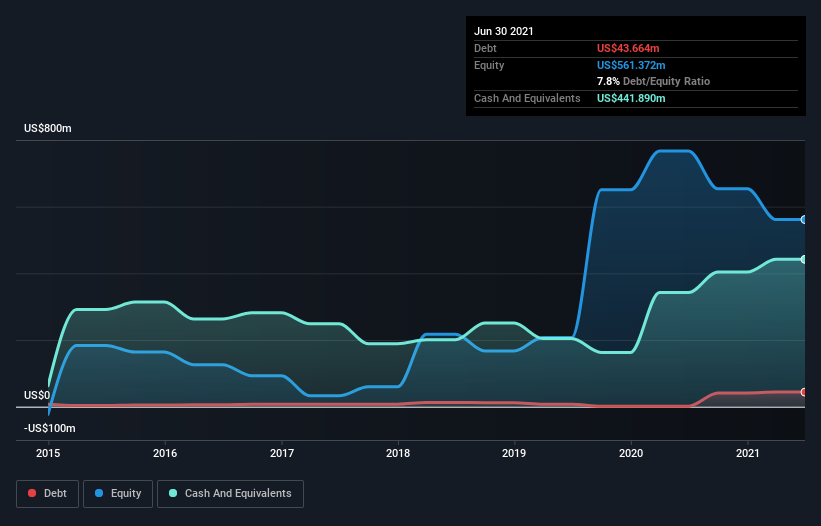- United Kingdom
- /
- Biotech
- /
- LSE:PRTC
Health Check: How Prudently Does PureTech Health (LON:PRTC) Use Debt?

David Iben put it well when he said, 'Volatility is not a risk we care about. What we care about is avoiding the permanent loss of capital.' When we think about how risky a company is, we always like to look at its use of debt, since debt overload can lead to ruin. We note that PureTech Health plc (LON:PRTC) does have debt on its balance sheet. But should shareholders be worried about its use of debt?
When Is Debt Dangerous?
Debt and other liabilities become risky for a business when it cannot easily fulfill those obligations, either with free cash flow or by raising capital at an attractive price. Ultimately, if the company can't fulfill its legal obligations to repay debt, shareholders could walk away with nothing. However, a more common (but still painful) scenario is that it has to raise new equity capital at a low price, thus permanently diluting shareholders. Of course, debt can be an important tool in businesses, particularly capital heavy businesses. The first thing to do when considering how much debt a business uses is to look at its cash and debt together.
View our latest analysis for PureTech Health
What Is PureTech Health's Net Debt?
As you can see below, at the end of June 2021, PureTech Health had US$43.7m of debt, up from US$1.46m a year ago. Click the image for more detail. However, it does have US$441.9m in cash offsetting this, leading to net cash of US$398.2m.

How Healthy Is PureTech Health's Balance Sheet?
According to the last reported balance sheet, PureTech Health had liabilities of US$213.9m due within 12 months, and liabilities of US$121.6m due beyond 12 months. Offsetting these obligations, it had cash of US$441.9m as well as receivables valued at US$3.84m due within 12 months. So it actually has US$110.2m more liquid assets than total liabilities.
This surplus suggests that PureTech Health has a conservative balance sheet, and could probably eliminate its debt without much difficulty. Simply put, the fact that PureTech Health has more cash than debt is arguably a good indication that it can manage its debt safely. There's no doubt that we learn most about debt from the balance sheet. But it is future earnings, more than anything, that will determine PureTech Health's ability to maintain a healthy balance sheet going forward. So if you want to see what the professionals think, you might find this free report on analyst profit forecasts to be interesting.
Over 12 months, PureTech Health made a loss at the EBIT level, and saw its revenue drop to US$11m, which is a fall of 12%. We would much prefer see growth.
So How Risky Is PureTech Health?
We have no doubt that loss making companies are, in general, riskier than profitable ones. And the fact is that over the last twelve months PureTech Health lost money at the earnings before interest and tax (EBIT) line. And over the same period it saw negative free cash outflow of US$147m and booked a US$193m accounting loss. Given it only has net cash of US$398.2m, the company may need to raise more capital if it doesn't reach break-even soon. Overall, its balance sheet doesn't seem overly risky, at the moment, but we're always cautious until we see the positive free cash flow. There's no doubt that we learn most about debt from the balance sheet. But ultimately, every company can contain risks that exist outside of the balance sheet. For instance, we've identified 2 warning signs for PureTech Health (1 doesn't sit too well with us) you should be aware of.
If you're interested in investing in businesses that can grow profits without the burden of debt, then check out this free list of growing businesses that have net cash on the balance sheet.
New: Manage All Your Stock Portfolios in One Place
We've created the ultimate portfolio companion for stock investors, and it's free.
• Connect an unlimited number of Portfolios and see your total in one currency
• Be alerted to new Warning Signs or Risks via email or mobile
• Track the Fair Value of your stocks
Have feedback on this article? Concerned about the content? Get in touch with us directly. Alternatively, email editorial-team (at) simplywallst.com.
This article by Simply Wall St is general in nature. We provide commentary based on historical data and analyst forecasts only using an unbiased methodology and our articles are not intended to be financial advice. It does not constitute a recommendation to buy or sell any stock, and does not take account of your objectives, or your financial situation. We aim to bring you long-term focused analysis driven by fundamental data. Note that our analysis may not factor in the latest price-sensitive company announcements or qualitative material. Simply Wall St has no position in any stocks mentioned.
About LSE:PRTC
PureTech Health
Engages in the development and commercialization of biotechnology and pharmaceutical solutions in the United States.
Slight with mediocre balance sheet.
Market Insights
Community Narratives



